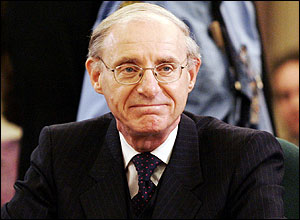Canada's first tentative steps into the realm of televised nominations ended up being a rather colourless affair that, as promised, was devoid of the partisan sniping that typifies parliamentary committees.
When he entered the room amid a crush of photographers, a smiling, relaxed Rothstein made a point of introducing himself to each of the committee members.
Throughout his 3 1/2 hours before the television cameras yesterday, the dark-suited Rothstein answered questions with equanimity, along with a healthy dose of self-deprecation.
In his opening remarks, Rothstein, a veteran of the Federal Court of Appeal, offered a glimpse of the prudent judicial philosophy he will bring to the country's highest court.
He said judges have the ability to strike down laws deemed unconstitutional, but added "that doesn't mean judges have some kind of upper hand over Parliament or the legislatures."
Rothstein allowed that the courts have an obligation to render judgments based on fact and are bound to uphold equality rights under the Charter of Rights and Freedoms, but pointed out they should always be mindful the laws they strike down were passed by a democratically elected body.
The 12 members of the specially constituted ad hoc committee asked a barrage of questions that ranged from obscure points of law, to judicial activism, to cameras in the courtroom, to the application of the Charter.
Alberta Tory MP Diane Ablonczy (Calgary-Nose Hill) asked what Rothstein thought about "judicial temperament," a term Prime Minister Stephen Harper used last week to describe jurists who interpret the law strictly and avoid "inventive" rulings.
"They should apply the law. They shouldn't depart from the law. They shouldn't be inventing their own laws," Rothstein replied. "They should use common sense and they should use discretion. Those are all aspect of judicial temperament that I think are appropriate."
Committee members quizzed Rothstein on his feelings about the federal gun registry, aboriginal rights, security certificates and mandatory minimum sentences, but he either skirted the questions or gently batted them aside, saying it wouldn't be appropriate for him to answer.
Once, he jokingly thanked Justice Minister Vic Toews, who chaired the meeting, for "throwing me a lifeline" by interrupting a ticklish question on the notwithstanding clause.
Rothstein admitted that being a unilingual anglophone means he'll have to work harder, and that his lack of expertise with Quebec's Civil Code will also be an early hindrance.
NDP MP Joe Comartin (Windsor-Tecumseh) wanted to know how Rothstein has learned to reconcile situations where the law says one thing, but his personal bias says another.
|
`They should apply the law. They shouldn't depart from the law. They shouldn't be inventing their own laws' |
"After that happens a few times, you tend to become more aware and sensitive to the legal side of the issue and you tend to have to follow the law. That's our system," he said.
Rothstein also admitted to some trepidation over the whole hearing process.
"I wouldn't be honest if I said I enjoyed spending my Monday afternoons this way, but as I always say to my kids, if there's an easy way and a hard way the Rothsteins always choose the hard way," he said.
In his careful answers, Rothstein appeared to satisfy the divergent preoccupations of all the parties, advocating judicial restraint on the one hand but showing openness to affirming Charter rights on the other.
It was a master class in judicial tact that prompted at least one opposition compliment over Rothstein's ability at being "diplomatic" on thorny questions.
Once it was all over, Toews said he won't hesitate to recommend Rothstein for the court. Harper will go through the formalities of the appointment tomorrow.
When that is done, the Winnipeg-born Rothstein, 65, will officially replace retired justice John Major as the Prairies' representative on the court. Rothstein can remain on the high court for a decade before reaching mandatory retirement age.
In an interview, Major applauded Rothstein's nomination, but expressed concerns the public hearing is simply the beginning of increased political involvement in the way the government appoints Supreme Court justices.
"The fact that it looks innocuous and may be helpful hides a lot of the problems that it may create and specifically what I think is going to be a recurring problem," Major said.
"They say this isn't going to be a political process. But we've been around long enough to know that if it goes into Parliament it becomes political."
He pointed to the fact that a number of the questions MPs asked — which he described as "mediocre," "pathetic" and "inane" — had little connection to the proceedings, but were more focused on the rivalries around the committee table.
The three opposition parties effusively praised Rothstein's qualifications and said he was eminently suited to the high court, even if not all were thrilled with how he'll get there.
Comartin said the process could well influence future governments into choosing nominees who are comfortable under the spotlight rather than the best candidate.
Bloc Québécois justice critic Réal Ménard said the process was very civil and worthwhile even if "I think we could have gone a little further."
The nine-member Supreme Court of Canada hears about 80 appeals a year from lower courts, including cases involving questions of public importance, major issues of law, constitutional issues and federal-provincial powers.
